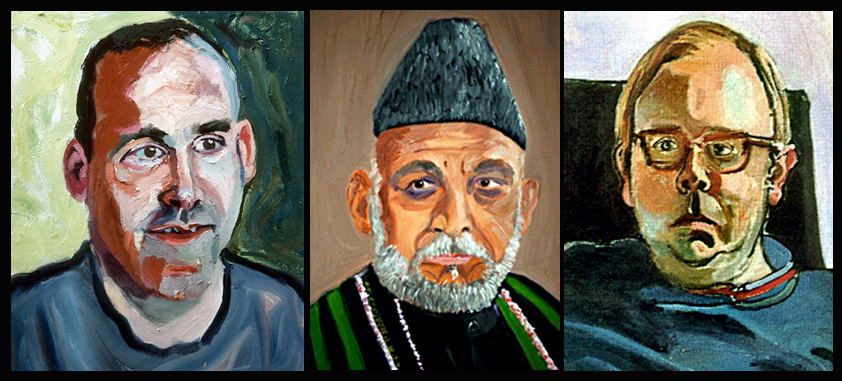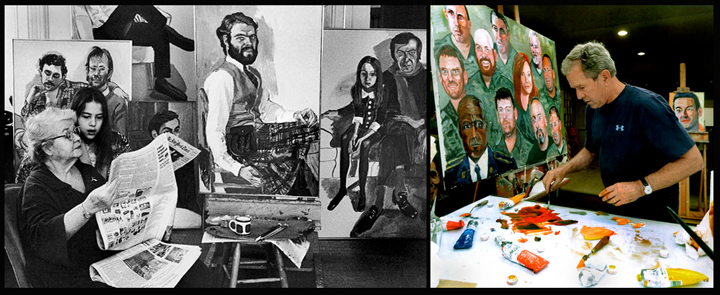Where is George W. Bush — the post-presidential, sensitive painter of humanity — when Joe Biden needs him? As chairman of the board of the US Constitution Center in Philadelphia, on Veterans’ Day 2018 Joe Biden arranged for Bush and his wife Laura to receive the coveted Liberty Medal for their work with veterans. Biden, for certain, did this out of his famous instinct to work across-the-aisle; in this case, he seemed to want to make a warm and friendly public gesture to a Republican ex-president who clearly needed a life ring.
Of course, one of the reasons Mr. Bush needed a political life ring was that it was he who made the two fateful decisions that involved the United States in two disastrous foreign wars that quickly turned into classic quagmires. The man is branded.
I’ve been a Biden critic in the past and could be in the future, but the criticism over his messy exit from Afghanistan is either partisan nonsense or fear of the inevitable Republican backlash. The biggest strike against Biden in the military violence department is that he’s a Democrat, which means whatever he does will be fodder for relentless Republican “gotcha!” attacks.
After 241 Marines were blown up in a 1983 terrorist bombing in Beirut, Ronald Reagan somehow fled Beirut with his tail between his legs and got away with it. He was a Republican. George W. Bush, of course, was re-elected after ignoring a lot of very wise opposition (most of it from the left) and setting in motion two foreign policy disasters. Now, many of the very same people who let these Republicans get away with their military fiascos and all the dead young soldiers on their watch are now piling on President Biden. If it was a thriller it’d be titled The Benghazi Protocol.
George W. Bush has become moderately famous for expressing himself as a painter. I never had much respect for President Bush, but his taking up painting instead of golf or speech-making threatens to humanize the man. He started out painting his pets; then he did a series on world leaders; and he ended up painting the men and women he sent to Iraq and Afghanistan. I actually paid $35 to buy a copy of his book of veteran paintings, Portraits Of Courage: A Commander In Chief’s Tribute To America’s Warriors.
“This is a tribute to men and women who volunteered, many in the years after 9/11, to defend our country.” In the introduction, he tells us, “I studied the stories and photographs of the warriors. As I painted them, I thought about their backgrounds, their time in the military, and the issues they dealt with as a result of combat.” He recognizes their post traumatic stress issues. “I wanted to show their determination to recover, lack of self-pity, and desire to continue to serve in new ways as civilians.”
I know many veterans with PTSD and many who fit his description about a “determination to recover” — but the ones I know tend to damn the wars they were sent to fight and that caused their difficulties. They also damn the politicians who decided to create those wars. Abandoning the idea their war was a noble effort is, for them, the absolute key to healing and liberation.
I’m not an art critic, but some of Bush’s paintings are not bad — albeit in a naive, primitive way. Self-expression can be quite therapeutic for someone carrying a dark burden. In Mr. Bush’s case, I’d argue he suffers from a variant of Post Traumatic Stress Disorder (PTSD) what we might call Post Decision Stress Disorder (PDSD). That is, his suffering is not due to combat experience, but to the fact — as the self proclaimed “decider” — he decided two of the three most destructive US foreign policy debacles in the post WWII era. That’s quite a burden to carry; it might keep the best human being up at night.
Some of Bush’s paintings share something of the qualities in paintings by the famous artist Alice Neel. While Bush copied many of his images from sources like Google, Neel’s work was of people she loved or knew intimately. That is, she was an artist grounded in life — no doubt a leftist — who relished the richness of humanity over the power to control it. This would seem the very opposite of an ex Republican president killing time — maybe assuaging some guilt — by dabbling in paint.

[ Top, left to right: Chris Demars, seriously wounded by a suicide bomber in Afghanistan (Bush); Hamid Karzai, the puppet president Bush appointed in Afghanistan (Bush); and Henry Geldzahler, art curator and historian (Neel). Below, Alice Neel with some of her paintings; and George W. Bush painting veterans. ]

Granting the man his humanity, it seems natural Bush would question the terrible decisions he made as an out-of-his-league President of the United States. One aspect of PTSD is the mental haunting from decisions one made under stress that went horribly wrong. Whether any possible suffering by Mr. Bush is real or just overly-generous speculation on my part; or whether any possible suffering is rooted in morality or just regret that he’s become a joke and a political pariah — only he can know.
But if George W. Bush is an honorable man, he might consider paying Joe Biden back for awarding him that Liberty Medal on Veterans’ Day 2018 in Philadelphia. Having the guy who started the debacle publicly support the current president’s overdue, necessarily messy exit from it would be helpful. As for the Veterans Day Liberty Medal event, I was able to get inside and, by phone, help direct the Iraq veterans and Gold Star mothers outside so their chant of “Shame! Shame! Shame!” could be heard by Biden and Bush inside.
Like much of the patriotic hoopla in support of post-WWII US Militarism, the speeches in the Liberty Medal event were based on a popular, but specious, idea: That US soldiers in places like Vietnam, Iraq and Afghanistan were fighting overseas in those places for our “liberty” here at home. Bush in the introduction to his paintings of veterans literally cites this idea. It’s one of the most profound bullshit ideas that thrives in militarized America. The truth is, members of the anti-war movement were the ones struggling for the constitutional liberty and the power to tell the government its wars were immoral; it was people who went to jail rather than serve in Vietnam; people who did alternative service, some in quite dangerous places.
While history is complicated and nuanced, beyond the propaganda, the truth is our soldiers were sent to Vietnam to fight for US domination following the collapse of European Colonialism in the so-called Third World and because of Cold War fears of the Soviet Union. Iraq and Afghanistan came following the downfall of the Soviet Union and were wars attributable to presidential decision-making based on the felt need for vengeance. Diplomacy and/or military actions short of outright invasion and occupation were passed up. It cost American society and its citizenry many trillions of dollars that might have been used for other things.
We can’t change any of that. But for our own good we can learn to accept the hard truth. Peace through world military domination is an idea that died with the 20th Century.
Joe Biden gave a good speech defending his decision to get out of Afghanistan. It’s an unfortunate fact that the United States (or any country) cannot exit a 20-year-war it has obviously lost without the endgame being a mess. The exit from Afghanistan was light-years better than the one from Vietnam; plus, it’s not over. In Veterans For Peace, we like to say: “Wars are easy to start and very difficult to stop.” Back in the Vietnam era, an anti-war senator was asked how the nation could accomplish an exit from a quagmire like Vietnam. His answer was eloquent: “Ships and planes.” Call it the Nike approach: Just Do It!
In the end, that’s what the Biden administration wisely did in Afghanistan. The Republican right could be counted on to flog the Stabbed In The Back Myth ad-nauseum. The point is to look forward, not backward. There’s too much at stake. In Afghanistan, the US seems to be working diplomatically as much as possible with the Taliban to get any Americans out who want to get out. The point is to negotiate even if it’s a mess — or because it’s a mess.
Then, we need to get on with bread & butter domestic issues like climate change, voting rights and the economic rights of working people to form unions and to have a living wage. There’s the dicey matter of domestic terror. For sure, the US needs to keep abreast of dangers to its security beyond its borders; but if citizen rights and honest constitutional government matters, our worst terrorist enemies are now home grown.
January 6 was a warning.
